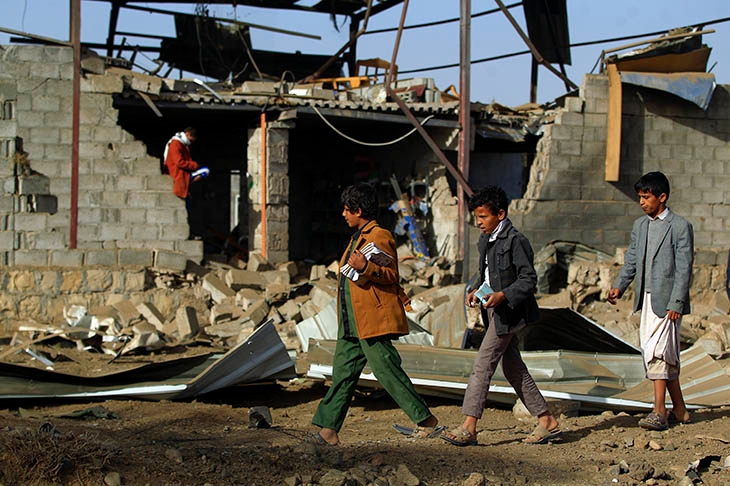We don’t know whether ‘Aziz H’ listened to radio plays as he grew up in Yemen. In fact we don’t even know his real name, nor what he looks like. He was unable to get the visa that would have allowed him to come to London to receive his prize as one of the winners in this year’s BBC World Service/British Council International Playwriting Competition. His drama, A Broken Heart in a Warzone, is the first he’s written for radio but he seems to know instinctively how to create character through voice alone, atmosphere through simple cues, drama out of juxtaposing situations.
‘As someone who isn’t a writer,’ he told the competition organisers, ‘I doubted making it to the shortlist.’ That’s what makes this writing award so integral to the World Service and what it stands for. It gives anyone who can write in English the chance to have their work recognised, their voice heard (the winning plays are broadcast around the world to a potential audience of up to 79 million listeners). All the competing writers have to do is come up with a script of approximately 8,000–10,000 words (53 minutes of air time max) and send it off to London via the internet. There’s nothing to pay to enter. The only writers not allowed to take part are those who live in the UK.
The competition, held every two years, is a massive judging enterprise with 1,436 entries this year from Rwanda to Romania, Belgium to Botswana. I make no apology for mentioning it each time it comes around as the plays it produces have an edge, a quality that is usually quite raw, because the writers are often first-timers, yet always deeply felt and original. The stories they tell deal with classic dramatic themes — love, sex, adultery, crime, punishment, a change of heart, poverty and upheaval — but there’s always something different about them, another atmosphere or tone, sometimes challenging, usually surprising.
Aziz H’s script, which took the prize for English as a second language, is not, as you might anticipate from the news reports from Yemen, a dark, doomy, politically driven insight into his war-torn homeland. (The other prizes are for English as a first language, won by Colette Victor from Belgium, and a special award dedicated to the memory of the Bulgarian journalist Georgi Markov, who was murdered in 1978 with a poison-tipped umbrella spike, which was given to Bode Asiyanbi from Nigeria.) As you’ll discover if you tune in (or catch up), it’s a light-hearted crime caper, set amid the sound of gunshot and the shriek of jet bombers, that is also subtly streaked with melancholy.
Ali and Hatem are a pair of incompetent petty thieves using the airstrikes as an excuse to pick their way into houses emptied of people because of fear of the bombs. They, in contrast, are waiting impatiently for the strikes to begin so they can get to work. One day, while casing a house looking for booty, Hatem falls and hits his head, slipping on what they later discover to be a pool of blood. Has the house been hit, is this a casualty of the war, and, if so, where’s the body?
Meanwhile Dalia, a bored, frustrated wife, is indulging in an adulterous affair with Rami, the local inspector of police, when her husband Khalid discovers them. Elsewhere in town there’s a lion on the loose, which has escaped from the zoo after a bomb explosion. To weave his threads together, Aziz H takes us on a quite unexpected ride into the imagination, both domestic and fantastical.
The play was directed by Marion Nancarrow, who has for many years championed the continuation of the prize (which was set up in the late 1980s) but who has just retired. Fingers crossed it survives the BBC’s money-driven makeover that is cutting swathes through the traditional broadcast schedules, introducing more repeats and fewer original programmes.
We’re being urged every minute of the day to listen to more podcasts, and via BBC Sounds. Addicted to Sex, for example, a ‘box set’ of six 20-minute episodes, does exactly what it says on the lid, giving us the frank confessions of sex addicts. The first episode includes ‘an incredibly rare interview’ with Neila, originally from central Asia, who talks candidly about her obsession with masturbation (‘you’re going to hear that word a lot’).
We are warned that the interviews will be ‘barely edited’, that there will be ‘no BBC bleeping here’, that ‘you’ll know everything we [the producers] know’ — ‘because we think it helps you understand the people you’re listening to better’. But here we are in an investment bank in the early 2000s, with Neila, who’s grown up in a ‘traditional’ family and knows nothing about sex. Most of her colleagues are male; they’re all competing for promotion. There’s a lot of ‘subtle bullying’. Tell me something I didn’t already know. Take me back to Neila’s home village. Explain how she ended up in London and in banking. Don’t just give me descriptions of how she feels. And try to come up with a title that doesn’t simply speak to taglines.






Comments